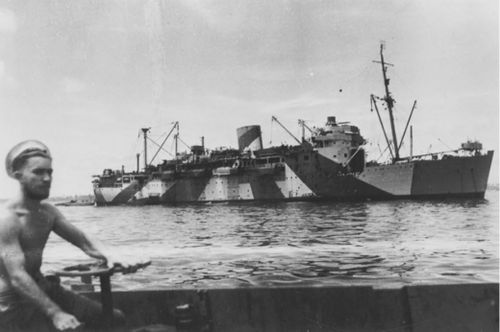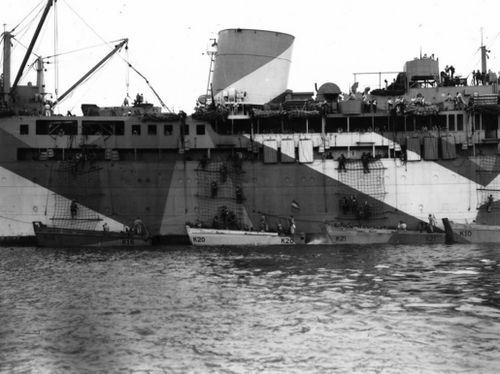Difference between revisions of "HMAS Kanimbla"
From Our Contribution
(→Sydney to Kure, japan18 February - 3 March 1948) |
(→Remarks) |
||
| Line 30: | Line 30: | ||
| − | In June 1940 she was repositioned to operate out of Singapore, patrolling the Malay and East Indies coast lines. On 24 Aug 1941, with 300 Indian troops aboard she entered the Iranian port of Bandar Shahpur, capturing eight German and Italian merchant ships with valuable cargoes, plus two Iranian gunboats and a floating dock. Further patrol work followed before she escorted the first convoy to flee Singapore after the Japanese attack on Malaya to Melbourne. | + | In June 1940 she was repositioned to operate out of Singapore, patrolling the Malay and East Indies coast lines. On 24 Aug 1941, with 300 Indian troops aboard she entered the Iranian port of Bandar Shahpur, capturing eight German and Italian merchant ships with valuable cargoes, plus two Iranian gunboats and a floating dock. Further patrol work followed before she escorted the first convoy to flee Singapore after the Japanese attack on Malaya, to Melbourne. |
| − | On 2 Feb 1943 the ''Kanimbla'' arrive in Sydney for conversion | + | On 2 Feb 1943 the ''Kanimbla'' arrive in Sydney for conversion as a Landing Ship Infantry, with work completed by 1 Jun 1943 when she was recommissioned. the rest of 1943 was spent in Australian waters before she became involved in exercises to prepare for landing on Pacific islands. The first landing she was involved with was at Hollandia in Dutch New Guinea. This was followed by landings at Morotai, Leyte Gulf, Lingayen (Luzon Island). Following transport tasks in New Guinea theatre of war she returned to Sydney on 7 Mar 1945. |
| − | ''HMAS Kanimbla'' returned to participate in the invasion of Brunei in June and the landings at Balikpapan in early July 1945. At the completion of hostilities, ''HMAS Kanimbla'' was used to repatriate Australian servicemen, and return Dutch civilians to the East Indian islands. Several voyages between Sydney and Japan followed to transport our Occupying troops and their stores between October 1946 and June 1948. | + | ''HMAS Kanimbla'' returned to participate in the invasion of Brunei in June and the landings at Balikpapan in early July 1945. At the completion of hostilities, ''HMAS Kanimbla'' was used to repatriate Australian servicemen, and return Dutch civilians to the East Indian islands. Several voyages between Sydney and Japan followed to transport our Occupying troops and their stores between October 1946 and June 1948. Her last voyage to Japan was followed by decommissioning on 25 Mar 1949. |
| − | Once refitted she was returned to her owners | + | Once refitted, on 13 Dec 1950 she was returned to her owners who operated her until selling her in 1961 to the Pacific Transport Company. Renamed ''SS Oriental Queen'' she spent the next three years transporting pilgrims to Jeddah from Jakarta. |
Chartered and later purchased by a Japanese shipping company, she operated between Guam and Yokohama until 1973 when he was sold for scrap. | Chartered and later purchased by a Japanese shipping company, she operated between Guam and Yokohama until 1973 when he was sold for scrap. | ||
| − | |||
==Battle Honours== | ==Battle Honours== | ||
Revision as of 18:11, 23 January 2023
Remarks
Built originally for McIlwraith McEachern Limited who from May 1936 until September 1939 used her to operate a passenger service between Cairns and Fremantle. With the outbreak of war she was requisitioned, and converted to an Armed Merchant Cruiser. On 6 Oct 1939 she was commissioned into the Australian Navy. Her first voyage was to Hong Kong, and she spent the first half of 1940 patrolling the Chinese and Japanese coasts looking for German ships to impound. She was able to capture 10 Norwegian ships and one Dutch ship of the Chinese coast and sent them to Hong Kong.
In June 1940 she was repositioned to operate out of Singapore, patrolling the Malay and East Indies coast lines. On 24 Aug 1941, with 300 Indian troops aboard she entered the Iranian port of Bandar Shahpur, capturing eight German and Italian merchant ships with valuable cargoes, plus two Iranian gunboats and a floating dock. Further patrol work followed before she escorted the first convoy to flee Singapore after the Japanese attack on Malaya, to Melbourne.
On 2 Feb 1943 the Kanimbla arrive in Sydney for conversion as a Landing Ship Infantry, with work completed by 1 Jun 1943 when she was recommissioned. the rest of 1943 was spent in Australian waters before she became involved in exercises to prepare for landing on Pacific islands. The first landing she was involved with was at Hollandia in Dutch New Guinea. This was followed by landings at Morotai, Leyte Gulf, Lingayen (Luzon Island). Following transport tasks in New Guinea theatre of war she returned to Sydney on 7 Mar 1945.
HMAS Kanimbla returned to participate in the invasion of Brunei in June and the landings at Balikpapan in early July 1945. At the completion of hostilities, HMAS Kanimbla was used to repatriate Australian servicemen, and return Dutch civilians to the East Indian islands. Several voyages between Sydney and Japan followed to transport our Occupying troops and their stores between October 1946 and June 1948. Her last voyage to Japan was followed by decommissioning on 25 Mar 1949.
Once refitted, on 13 Dec 1950 she was returned to her owners who operated her until selling her in 1961 to the Pacific Transport Company. Renamed SS Oriental Queen she spent the next three years transporting pilgrims to Jeddah from Jakarta.
Chartered and later purchased by a Japanese shipping company, she operated between Guam and Yokohama until 1973 when he was sold for scrap.
Battle Honours
- Pacific 1941-45
- New Guinea 1942-45
- Leyte Gulf 1944
- Borneo 1945
- Lingayen Gulf 1945
Crew Members
- Francis Edwin (Ned) Thornton 30 Dec 1942 - 18 Jun 1946
- Gavin Stirling Blackwood 26 January 1943 - October 1945
Soldiers carried
Brisbane to Morotai 2 - 11 May 1945
Morotai to Tarakan 17 - 21 August 1945
Lae New Guinea to Brisbane 25 Sep - 4 Oct 1945
Sailed 28 September
Tarakan to Morotai 10 - 13 December 1945
- [Arthur Donald Free]]

